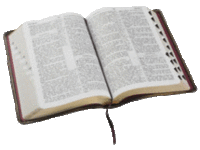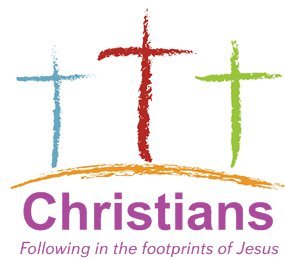SINGING – THE MUSIC OF THE CHURCH...
The New Testament church had a simple, uncomplicated style of worship, unlike the detailed and ritualistic form of worship practised by the Jewish people under the Law of Moses.
Much of the division in the religious world today has arisen because many churches have reverted to forms of worship found in the Old testament rather than following the pattern of worship found in the New Testament. For example, we find no mention of candles, incense, priestly robes, altars, or elaborate "church" buildings or temples in the life of the New Testament church, yet many of these things form a part of the worship of many modern churches.
It is our plea, then, to return to the simplicity of the New Testament teachings concerning the church, including the music of the church.
To be thorough, let us look at all the references to music in the New Testament...
| REFERENCES TO MUSIC IN THE NEW TESTAMENT | ||
|---|---|---|
| 1 | Matthew 9:23 | And when Jesus came into the ruler's house, and saw the minstrels and the people making a noise, |
| 2 | Matthew 11:17 | And saying, We have piped unto you, and ye have not danced; we have mourned unto you, and ye have not lamented. |
| 3 | Matthew 26:30 | And when they had sung an hymn, they went out into the mount of Olives. |
| 4 | Mark 14:26 | And when they had sung an hymn, they went out into the mount of Olives. |
| 5 | Acts 16:25 | And at midnight Paul and Silas prayed, and sang praises unto God: and the prisoners heard them. |
| 6 | Romans 15:9 | And that the Gentiles might glorify God for his mercy; as it is written, For this cause I will confess to thee among the Gentiles, and sing unto thy name. |
| 7 | 1 Corinthians 14:7-8 | And even things without life giving sound, whether pipe or harp except they give a distinction in the sounds, how shall it be known what is piped or harped? For if the trumpet give an uncertain sound, who shall prepare himself to the battle? |
| 8 | 1 Corinthians 14:15 | What is it then? I will pray with the spirit, and I will pray with the understanding also: I will sing with the spirit, and I will sing with the understanding also. |
| 9 | Ephesians 5:19 | Speaking to yourselves in psalms and hymns and spiritual songs, singing and making melody in your heart to the Lord; |
| 10 | Colossians 3:16 | Let the word of Christ dwell in you richly in all wisdom; teaching and admonishing one another in psalms and hymns and spiritual songs, singing with grace in your hearts to the Lord. |
| 11 | Hebrews 2:12 | Saying, I will declare thy name unto my brethren, in the midst of the church will I sing praise unto thee. |
| 12 | Hebrews 13:15 | By him therefore let us offer the sacrifice of praise to God continually, that is, the fruit of our lips giving thanks to his name. |
| 13 | James 5:13 | Is any among you afflicted? Let him pray. Is any merry? let him sing psalms. |
| 14 | Revelations 5:8-9 | And when he had taken the book, the four beasts and four and twenty elders fell down before the Lamb, having every one of them harps, and golden vials full of odours, which are the prayers of saints. And they sung a new song, saying, Thou art worthy to take the book, and to open the seals thereof: for thou wast slain, and hast redeemed us to God by thy blood out of every kindred, and tongue, and people, and nation; |
| 15 | Revelations 14:2-3 | And I heard a voice from heaven, as the voice of many waters, as the voice of a great thunder: and I heard the voice of harpers harping with their harps: And they sung as it were a new song before the throne, and before the four beasts, and the elders: and no man could learn that song but the hundred and forty and four thousand, which were redeemed from the earth. |
| 16 | Revelations 15:2-3 | And I saw as it were a sea of glass mingled with fire: and them that had gotten the victory over the beast, and over his image, and over his mark, and over the number of his name, stand on the sea of glass, having the harps of God. And they sing the song of Moses the servant of God, and the song of the Lamb, saying, Great and marvellous are thy works, Lord God Almighty; just and true are thy ways , thou King of saints. |
| 17 | Revelations 18:22 | And the voice of harpers, and musicians, and of pipers, and trumpeters, shall be heard no more at all in thee; and no craftsman, of whatsoever craft he be, shall be found any more in thee; and the sound of a millstone shall be heard no more at all in thee; |
If we consider the 17 New Testament passages above which make reference to some form of music, we quickly see that some of them do not directly refer to the worship of the church.
Excluding the first two passages from Matthew (which do not relate to the church), 1 Corinthians 14:7-8 (in which the pipe, the harp and the trumpet are used as illustrations only), and the four passages from the book of Revelations (which all refer to heaven), we are left with ten passages that relate to the worship of Jesus' disciples or of the church.
Each of these passages refers to someone singing hymns or praises to God, singing to God's name, singing with the spirit and with understanding, speaking to others in psalms, hymns and spiritual songs while making melody in their hearts to the Lord, teaching and admonishing others in psalms, hymns and spiritual songs while singing with grace in their hearts to the Lord, singing praises in the midst of the church, or offering the sacrifice of praise to God through the fruit of their lips.
It is interesting that not one Scripture refers to the early church using a musical instrument apart from the human lips or heart.
Nor is there any reference outside the scriptures to any church using a mechanical instrument of music for hundreds of years after this time. On the contrary, there are numerous records of prominent "church leaders" speaking out strongly against the addition of other musical instruments.
Unlike other forms of music making, singing is a verbal communication which engages the thinking and being of the individual in conversation with someone else. Harps, trumpets, organs, pianos, cymbals, guitars, or other man-made instruments, cannot speak, teach, admonish, give thanks, give praise, proclaim, confessor make melody in the human heart. The sounds they make are an entirely different form of music.
Just as Nadab and Abihu tried to introduce their own fire in Leviticus 10, fire which God had not commanded or authorised, men have introduced their own forms of music into the church today, music which God has never commanded or authorised.
Leviticus 10:1-3
And Nadab and Abihu, the sons of Aaron, took either of them his censer, and put fire therein, and put incense thereon, and offered strange fire before the LORD, which he commanded them not. And there went out fire from the LORD, and devoured them, and they died before the LORD. Then Moses said unto Aaron, this is it that the LORD spake, saying, I will be sanctified in them that come nigh me, and before all the people I will be glorified. And Aaron held his peace.
As High Priest of God's people, Aaron knew his sons had sinned in changing what God had directly commanded. Substituting their own fire for God's fire was disobedient and violated God's pattern for their worship.
Likewise, we also sin if we modify what God has authorised to suit ourselves.
The music of the new Testament church was (and remains) simply the vocal music of the human voice – what we know as "a cappella" (literally, "in the chapel" or unaccompanied).
As popular as it has become, there is no Scriptural authority for "cantata" or accompanied singing, nor for the "worship groups" or bands found in many churches today. These are simply additions of men.
In summary, the Scriptures teach the church to sing. They teach the church what to sing (psalms, hymns and spiritual songs), they teach the church how to sing (with spirit and understanding), and they teach the church why it should sing (to teach, to admonish, to give thanks, to praise God and to express joy). Only the human voice can do all these things.
© Bevan Collingwood 2016

